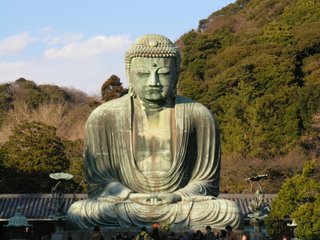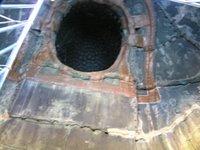
I was browsing through the pictures of my visit to Tokyo this New Year and the picture of this gigantic 13 meter great Buddha of Kamakura stood out. I was transported to Kamakura and of the time I spent there walking into the statue. Yes! You can get into the statue and look into Buddha’s hollow empty head. It is this emptiness inside the statue that was very striking. The statue was built in the 13th century and was housed inside a large temple. The temple was washed away in a tsunami in the late 15th century and Buddha somehow has withstood the test of time. A visit to Kamakura which is full of Buddhist temples is incomplete without a visit inside the great 13.35 meter Buddha.
This essay wasn’t supposed to be a travelogue or about Kamakura. I had intended to write about how intriguing I found Buddha’s empty head to be. Why such an enlightened soul would have an empty hollow head was beyond my comprehension. In the space within the walls of the Buddha I felt very insecure. I realized how my big wide world was confined to finite space within the statue depriving me of freedom. As I dwell on this issue of empty space many unanswered questions keep following me like an avalanche, chasing me into wild thoughts and making me obsess.
Why do we all obsess over unanswered questions? This question brings me back to the great Buddha. Buddha was obsession incarnate. He obsessively questioned and analyzed the philosophy of life for years and he taught his disciples the “true” meaning of life. This “truth” is what I felt in looking at his empty head at Kamakura. That hollow empty space is the eternal “truth”, something that we feel around us at all times. We just don’t realize the space around us until or unless it is restricted or defined. Meditation also I believe makes us understand this very “truth” that the universe is nothing but empty space. How far within one can you delve for answers? Or, how small can you dissect an atom? (It is interesting to note that root of the word atom means indivisible) The root of everything in essence seems to be embedded in nothing! The complexity that covers this simple nothing is the marvel of science.
 The empty head
The empty head
Buddham charanam gachami (I take refuge in the Buddha)…
8 comments:
Sabash Robbie
You have knowingly or unkowingly touched the heights of Vedanta and all eastern religion's (Zen,Buddhism,taoism) common thread and the ultimate question of 'I' and its relationship with the universe.
First time in your blog....that was an intellectual post....its amazing to know that that buddhas statue is designed that way...may be to say....he was pure of all negative thoughts that todays men suffer from....
Ganesh,
I dont know if I understand vedanta that much to write about it, this was what I felt about emptiness when I experienced it inside the statue of a very enlightened man.
Shuba,
I am glad you found your own analogy to the empty space. I was really amazed to see that the statue was full of empty space on the inside, maybe it was built with a higher meaning one that I do not fully comprehend.
Very interesting that you mused over the hollowness of buddha's head.
I was amused by your qualifier for buddha: obsession incarnate. very true.
I have read that Vedanta means Veda+anta = end of knowledge. Maybe the obsession lead to end of all knowledge. Thinker UGKrishnamurti has said that (not JK - http://www.well.com/~jct/) all questions in him became a single big do or die question and it burnt itself without an answer and he became a hollow person. Ramana has the methodology (which is derived from advaita of sankara) converting every question to a single question: who is asking? Who am I?. I think the materially oriented believes that more possession of wealth leads to more happiness and the knowledge (or spirit) oriented person believes in more and more knowledge. UGK has said that both are rooted in the same desire: for something more, for a better future, for a better person, to become something or somebody. But without this desire for knowledge (the inherent curiousity: unlearnt; can be seen in even newborns) we would not be where we are now. But is there an end to questioning and is there ultimate knowledge? I was influenced a bit by www.actualfreedom.com.au where the author Richard describes an experience called Pure Consciousness Experience (PCE) which involves a direct perception of the world - he contrasts this to the VOID experience of the buddhists and eastern traditions (satoris and samadhis: he calls them Altered States of Consciousness ASC). He says that the meaning of life is evident in such an experience and it is the ultimate solution for the human dilemma. Also, he says that everybody must have experienced this in their lives and it takes some digging to find out and redo. Just thought these things are relevant to your post... once again: I enjoyed your thought.
Srini,
All these things are certainly very relevant to this post. I like the way Richard calls the eastern experience VOID. I totally agree with him, after all eastern traditions seem to teach to delve deeper and deeper within for the solution and such thinking can lead to a VOID. I guess the pure consciousness experience is when you learn to look outside forgetting what you are on the inside, this is very much true of western societies. Both these approaches are required for correct investigation, i.e. one cannot just keep introspecting. Buddha is a prime example of both of these things. He first introspected and then decided to spread his seeds of knowledge, most of his teachings are focused on combining the PCE and the VOID experience.
Why do we obsess over any question at all? thats quite a poignant question to be asked to Buddha. I dont know what will his answer be. A man who advised people to free themselves from all bindings did not free himself from questions (on ultimate truth). or probably he finally did. (I dont know much of his life)
Theoretically, the moment we stop questioning, we cease to exist (in ones own mind). Even moments of absolute calmness within one self are probably moments that compare x, y, z states of calmness before concluding something as a moment of absolute calmness... thus leaving no escape from 'obsessing over questions' (in this case about calmness).
Possibly, a notch higher is to accept nothingness, and remain with no questions, which is hard for humans with all their great thinking abilities!
May be that's the reason Buddha decided to choose on greater questions like the ones on ultimate truth and did not really start his search as ' a search for nothingness'. Would be a futile expedition. :)
Although nothingness is theoretically the most comprehendible truth, practically we need to ask the enlightened souls (may be there is a different equation for nothingness in higher notch of thinking).
I prefer to stay in the lower notch of thinking and embrace nothingness as such.
It was a neat idea to brainstorm-thanks for putting up this article and sorry to bore you with my thoughts - I enjoyed reading your article.
The secret government has set up the HARP project in Alaska to push away Motherships that are from the future. As far as one light years. Yet the people of the secret government have a few large antigravity delta shaped spacecraft of their own. They are probably capturing spirit angels and putting them in magnetic cages. As soon as your country get starfighters shoot down the secret government starfighters because they have an angel trap on them.
They kill crashed down space alien with Zyklon-B poisen gas so they can steal thier spacecraft from another planet.
Some day the alien will kill of the entire military in retaliation. The advanced technology goes to Germany also
If Goddamn Adolf Hitler is still alive hes going to go to space and nock the stars out of alighnment with beam weopons.
Post a Comment